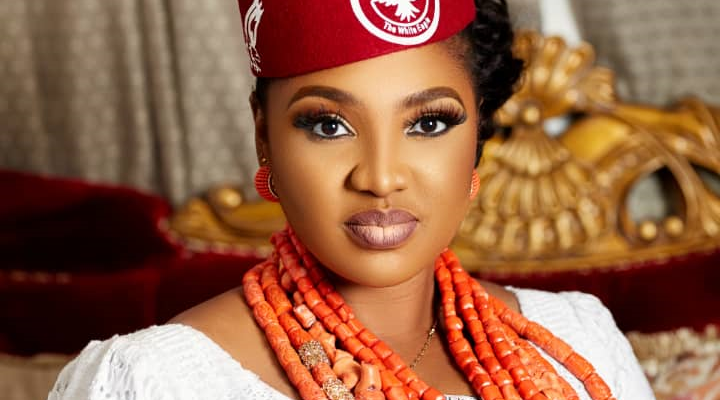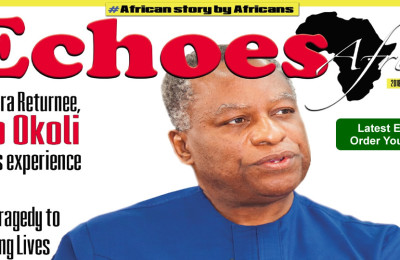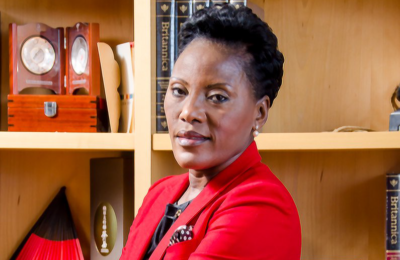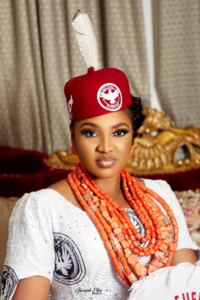 Shimite Bello is one of the few female women in politics in Nigeria who dares to hold on in a predominantly patriarchal society where opportunities for women at the top is sparse.
Shimite Bello is one of the few female women in politics in Nigeria who dares to hold on in a predominantly patriarchal society where opportunities for women at the top is sparse.
Born to Roseline and late Jacob Okwunudu Nwakalo of Ebu Kingdom, Delta state, Bello is one of the rising young female politicians in Nigeria, Africa’s most populous nation. With a bachelor’s degree in political science from the University of Ibadan, Bello’s professional journey started at a very early stage of her life, and is, to put it mildly, expansive.
She debuted as a TV presenter in 1992 with Clapper Board television in Lagos on a teenage show Teeny Boppers. During her undergraduate years, Bello worked with her older sister, Agatha Amata on the Inside- Out TV series, as Program Coordinator / Marketing Executive.
After the mandatory one year national service (NYSC), Bello created, produced and anchored “African Pot” and “ African Pot Extra,” a highly successful television documentary series that promotes traditional African cuisine, Tourist attractions, culture and investment opportunities in Africa. She is the author of two books “African Pot Recipe” and “100% Nigerian”.
She later ran a travel agency “Generations Travel Agency and Tours” between 2005 and 2012. Bello was also a contributing editor for the travel and tourism columns with Daily Trust Newspaper, Leadership Newspaper and African Travel Quarterly Magazine. She was an active member of the National Tour Operators of Nigeria (NATOP), National Association of Travel Agencies (NANTA), Federation of Tourism Association of Nigeria (FTAN) and Association of Nigerian Journalists in Entertainment and Tour-ism (ANJET). Shimite Bello began working with grassroots women and youths in financial literacy, gender mainstreaming, financial inclusion in the areas of Agriculture, Solid Minerals, ICT and Agency Banking. To broaden her knowledge, and skills set in order to be better prepared to work with, and help uplift grass-roots women, she trained with the Chartered Institute of Bankers of Nigeria (CIBN), Small & Medium Enterprises Development Agency of Nigeria (SMEDAN), and other DFID intervention partners. Bello joined Women in Public Management, Business and Administration (WIMBIZ), Rural Financing of Nigeria (RUFIN), Association of Non-Bank Micro-Finance Institutions of Nigeria (ANMFIN) and Chartered institute of Commerce, amongst others.
Taking it a step further, she found an NGO: Quintessential Businesswomen Association (QBWA) which now has a United Nations Consultative Status and works with different UN organs. QBWA has partnered with several domestic and international organizations, including the Central Bank of Nigeria (CBN), the Bank of Industry (BOI), Bank of Agriculture (BOA), the Niger Delta Development Commission (NDDC), DFID and USAID.
Bello caught the eye of the Executive Governor of Delta State who appointed her as the Executive Secretary of the state’s Micro, Small and Medium Enterprise Development Agency in 2015. Under the supervision and guidance of her boss, Governor Arthur Ifeanyi Okowa, Bello disbursed funds across various trades and occupations to all 270 wards in Delta State, among other assigned duties.
Part of the projects carried out is the Delta Food Export Initiative, Job Creation Steering Committee, Agricultural Marketing Board and the Delta State Focal Person for the Federal Government Intervention: National Social Safety - Net programme (a social investment program) that oversees N-Power, Home Grown School Feeding Programme, GEEP, and the Social Register and Cash Transfer.
Akpeli, as she is fondly called due to the chieftaincy title bestowed on her by Ebu Kingdom, previously worked as Technical Adviser on Business Ethics and Values under Mrs. Sarah Jubril, the Special Adviser to former President Goodluck Jonathan on Ethics and Values. She also served on committees, including Steering committee of USAID/NEXTT (Nigerian Expanded Trade & Transport) -LAKAJI Trade Corridor and the Agric - Business Development. She is an active member for policy formulation and amendment for National Assembly Business Environment Roundtable (NASSBER).
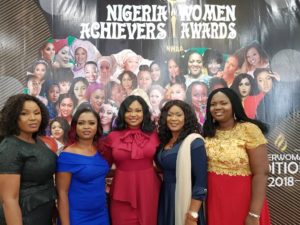 Bello’s interest in politics is no secret to those who know her from way back, so her choice of major in college did not in any way, come as a surprise. The surprise, according to Esther Ekanem, a longtime friend of hers, would be if she does not become a force to be reckoned with, at the national level within the next decade, “there’s no disputing that her versatility in business and career choices has put her in good stead to be a phenomenal leader.” That Bello saw the need to start from the bottom, deal with the grassroots, and all they grapple with, rather than dive straight into partisan politics speak volumes about her.
Bello’s interest in politics is no secret to those who know her from way back, so her choice of major in college did not in any way, come as a surprise. The surprise, according to Esther Ekanem, a longtime friend of hers, would be if she does not become a force to be reckoned with, at the national level within the next decade, “there’s no disputing that her versatility in business and career choices has put her in good stead to be a phenomenal leader.” That Bello saw the need to start from the bottom, deal with the grassroots, and all they grapple with, rather than dive straight into partisan politics speak volumes about her.
Akpeli is a multiple award winner in the areas of Community Development, Micro Finance, Youth and Women Development, Media and Agricultural Development. Her views on issues raised during her interview with Echoes Africa reveals more about her person. As a woman in Business in Nigeria, "getting things when you need them can be quite difficult. Getting paid on time, for products and services can be frustrating and, keeping your business prosperous is extremely difficult, mainly because the economy is “not very stable,” she shared.
A greater percentage of political leaders in Nigeria, Bello reveals, are men, and when the women get too close to them, people mis-interpret the relationship. The woman’s reputation is put at risk. The men however, don’t have to deal with that moral burden, said Bello. High portfolio positions are sparsely given to women, and the few who get it are sometimes almost a lone voice. Often, she continued, women feel overwhelmed by how much most of them put in, and viewed by the Governor himself. She handled a portfolio of about two billion Naira over four years, and oversaw the disbursement of loans to MSMEs, covering artisans, marketmen and, women of the state who are very important to the governor. Her office also gave loans to people in transport business, the butchers association, hairstylists / barbers.
They tried, according to Bello, to cut across specific trades for there to be some level of order and even spread in what was done. They worked with micro finance banks, and commercial banks, engaged in training of the micro finance banks, and later partnered with an NGO under Chevron, and together, they were able to further train staffers of the financial institutions, as well as train her own team in order to have a better relationship with their beneficiaries and partners.
She and her team also handled the federal government’s Social Investment program, N-power in the state, which was targeted at youth empowerment. They also handled the home- grown school feeding program, as well as gave out small loans to traders at the market and street hawkers;
A state-of-the-art center was built and equipped for the projects as the governor spared no costs in ensuring that students Bello and her team trained had stipend to live on, so they could concentrate and acquire the skills that could change their lives, and possibly create more jobs in the state, says Bello. They also trained people on production of the ethnic fabric, the “akwa ocha,” and so many people have gone on to do great things with them; wedding dresses, turbans, fascinators, skirts and tops “all kinds of creative things have been done with “akwa ocha” and we will do more, going forward, with some of these things we have set the foundation for. Based on the schedule we were given I’d say we achieved a lot. The person who took over from me will build on the foundation laid.”
At the end of her tenure in office, Bello was reap-pointed by the governor as his Executive Assistant on Export Initiatives and UNIDO Center. For her, the new portfolio is an extension of what she did in the first dispensation; “We are doing training on packaging, bran-ding, labeling, standardization, integrity for product and service delivery in readiness for export. So, any product I see, my interest would
be its export value. I am only interested to see products and services that can bring foreign exchange into Delta State.”
For Bello, the situation of women in Nigeria, as far as politics is concerned, is worse than what it was years back.
On political appointments and equity in terms of the Affirmative Action, the women in Nigeria are short-changed in her opinion and that, she reveals, has so many dimensions to it, with the women themselves being part of the problem. “A lot of our political leaders are men who have wives that are insecure, wives who are jealous, so when they see their husbands with a woman that is slightly attractive, there are usually issues of; “is he having a relationship with this woman?” So, there are so much suspicion of one another, and the men don’t want to deal with these issues. In politics, the wives, spouses play a very important role. If your spouse is not comfortable with a person, you have to choose between peace in your home and your preferred appointee.”
Another dimension, she continues, is that it is so much harder for the younger women. It is not an even-playing field for them, a situation she can attest to, as a married woman herself.
“There’s no space for you to be pregnant. There Is no space for school runs; to go drop off and pick up the kids from school. In Nigeria, women still have to mind titutes. So, women who can do the job are afraid of the name calling but if you want to do politics, you must be ready for the name calling. I think that’s one of the tricks men have used to keep women in the back burner. We saw the example of what happened to Natasha in Kogi State; in spite of the fact that she brought a huge investment to Ajaokuta Steel, when she dared to run against Yahaya Bello, the incumbent governor, she had her share of the bullying and name-calling and then the incident of her office being burnt down... She was called a prostitute; people asking her why she wanted to run against the governor... It’s hard for women. Apart from the financial aspect, you have other women having issues with you, as well as the men trying to bully you…”
Asked if there’s possibility of the situation of women improving in Nigeria, without adequate representation of women in the legislative arm, Bello’s response leaves you in no doubt on where she stands.
“How can they pass meaningful legislation when we don’t have enough women representation? Men cannot pass laws for women on issues that concern us. They think they know us, but they don’t… They do not even have the patience to take time to understand us, so they can never pass good laws for women. Women are the ones who will pass laws on issues that concern them, pass laws for children, youths and the underserved. So, we are losing in that regard because we don’t have enough representation to pass strong laws on rape, strong laws on maternity issues as it relates to work, strong laws on child labor and every other thing. With all due respect, these are not bills that men have the capacity to sponsor and pass into law.”
Nigerian women, declared Bello, are not okay with the statuesque. The situation has gone on for too long and the women are not prepared to take it for much longer. They are bitter. They are angry. They are frustrated. They don’t know what to do and how to get out of the quagmire. There was something the governor of Delta State, Ifeanyi Okowa did in the last council election, where he said, at least three women must be voted as councilors in every local government. Some local governments could not bring two women, and even at that, the people resist you. So, even though they give you this opportunity, you have to be able to fight to get the opportunities given.”
Bello vows that she is in politics to stay and charges the women of Africa, particularly Nigerian women to keep at it and not allow themselves to be browbeat
She encourages the few who have made it into politics to be the best they can possibly be, and “deliver.” That, she stated, is the encouragement other women need to venture in. This is what motivates her to find creative ways to achieve success in every portfolio she’s given, her current job inclusive. To fellow women of Africa, Ugo Fufu 1 of Ebu Kingdom declared;
“You are the most wonderful human beings ever. You are hardworking. No matter how nasty the man in your life gets, you always have a hot meal for him. You are a true mother going through pain and working it out. You do not jump ship easily. Even when you don’t get the best, you still try to work things out. You still try to find the good in what sometimes is not so good. You are the epitome of everything good. You are our African queen. You are beautiful. Some of us are going to continue to work to see that you get what you deserve, so you can have that smile on your face. Even if we don’t get to give you inheritance, we will work so that your daughters get to inherit something from cultures where women don’t inherit anything. Hang in there.

